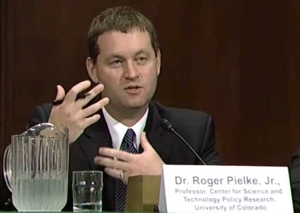 Dr Mike Kelly alerted me to Roger Pielke Jr’s thoughtful piece at WUWT titled Opening Up the Climate Policy Envelope. I heartily suggest you read it; below is a sample. As well as improving our thinking about climate policy, Dr Pielke makes it sound perfectly reasonable for convinced climate alarmists and unyielding climate sceptics not only to talk with each other but also to reach common ground. A miracle indeed. But wait, there’s more: the questions he poses are those we’ve been waiting for from our political leaders—questions, if quietly contemplated, that would fit them for the decisions we need from them and only they can give—if only they knew. –RT
Dr Mike Kelly alerted me to Roger Pielke Jr’s thoughtful piece at WUWT titled Opening Up the Climate Policy Envelope. I heartily suggest you read it; below is a sample. As well as improving our thinking about climate policy, Dr Pielke makes it sound perfectly reasonable for convinced climate alarmists and unyielding climate sceptics not only to talk with each other but also to reach common ground. A miracle indeed. But wait, there’s more: the questions he poses are those we’ve been waiting for from our political leaders—questions, if quietly contemplated, that would fit them for the decisions we need from them and only they can give—if only they knew. –RT
A sampling
- Fudged assumptions about the future are hampering efforts to deal with climate change in the present. It’s time to get real.
- If aircraft designers sought to improve the performance of a poorly designed aircraft not by improving its design, but by rejiggering their claims about aerodynamics, or airfoil design, or jet fuel combustion thermodynamics, to match the aircraft performance they desire, it is obvious that the aircraft would still perform badly. In the case of climate change, policy-makers and climate experts are doing something similar. In the face of ongoing failure to reduce global greenhouse gas emissions, they are rejiggering the way they define the climate change challenge as if that will somehow allow policies that have been failing for over 25 years to become successful.
- The failure of global climate policies to date suggests that new policy options should be explored— that we may need a significantly expanded policy envelope to begin to make satisfactory progress. But rather than exploring such options, we have instead been protecting the current policy envelope from critical scrutiny.
- The work on the IPCC’s Sixth Assessment Report looks to be similar in form and function to that of past reports, designed to support the UNFCCC but certainly not to open up new possibilities that might require different institutional arrangements.
- One possibility might include a commitment to the expansion of carbon-free energy in national energy mixes, as achieving zero emissions will require that almost all energy consumption come from sources that are carbon neutral. The world currently is at less than 15% carbon-free energy consumption.
- Succeeding in the stabilization of carbon dioxide at low levels in the atmosphere will require a massive reduction in the use of fossil fuels. There has been essentially no serious international policy focus on how this might actually be done.
- How might the world decommission such a magnitude of fossil fuel energy? The UNFCCC policy envelope has been an exercise in avoiding this question. What would it mean to get serious about answering it?
- What policy options would support innovation at the scale needed to transform the global energy system?
- Climate policy discussions have tended to emphasize worst case scenarios of the future. What might climate policy look like if scenarios expected to represent more likely futures are placed at the center of climate policy discussions?
Views: 207

“After Pulling Out Of Paris Climate Accords, U.S. Led The World In Decreasing Carbon Emissions Last Year”
https://www.dailywire.com/news/33129/after-pulling-out-paris-climate-accords-us-led-emily-zanotti
So much winning we are going to get sick of winning.
Meanwhile poor little NZ’s emissions rise
Sad